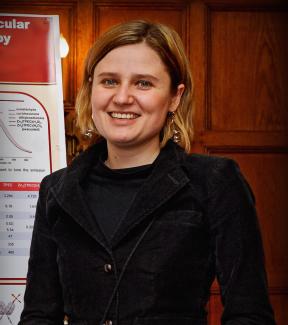Event
Organic Chemistry Seminar; Dr. Natalia Shustova, University of South Carolina
Inquiries please contact Rosa M. Vargas rvargas@sas.upenn.edu

The study of energy transfer (ET) processes is a cornerstone of modern physical and inorganic chemistry, which is driven by growing demand in efficient energy transfer and conversion, necessary to build a sustainable energy society independent from fossil fuels. Specifically, materials with a predesigned pathway for ET can address the urgent needs in fast enhancement of material performance in areas ranging from optoelectronic devices to photocatalytic systems and, thereby, drastically modify the existing energy and material landscape. Metal-organic frameworks (MOFs) have significant advantages to achieve directional ET. For instance, they provide a high level of control for chromophore arrangement, structural parameters, and photophysical properties, through rational chromophore design and synthetic conditions unprecedented for large light-harvesting ensembles and extended structures. In this presentation, mechanistic and structural aspects of directional energy transport will be discussed on the examples of photochromic, fulleretic, and biomimetic systems in order to harness MOFs as a versatile platform for energy utilization enhancement. This talk will also cover our recent efforts in the areas of electronic structure elucidation with a particular focus on bimetallic MOFs as well as testing framework modularity towards engineering actinide-based materials.
Bio:
Dr. Natalia B. Shustova received her M.S. degree in Materials Science from Moscow State University (MSU), Russia and two Ph.D. degrees in Physical Chemistry (MSU) and Inorganic Chemistry (Colorado State University). She then did postdoctoral research at the Massachusetts Institute of Technology. In 2013 she joined the faculty at the University of South Carolina. She is a recipient of the NSF Career Award, Camille Dreyfus Teaching-Scholar Award, Distinguished Undergraduate Research Mentor Award, Alfred P. Sloan Research Award, Cottrell Scholar Award, and Breakthrough Award. Her current research interests are graphitic hybrid materials for sustainable energy conversion, sensors, switches, and artificial biomimetic systems.
